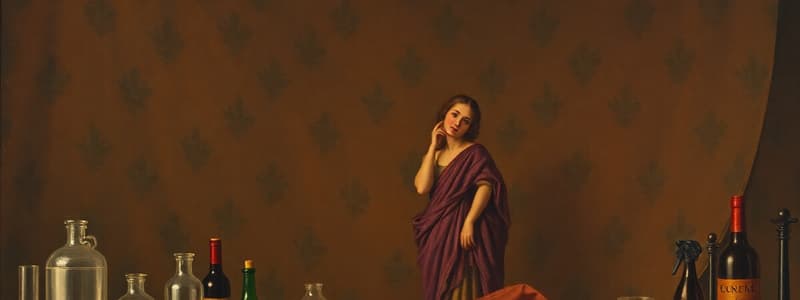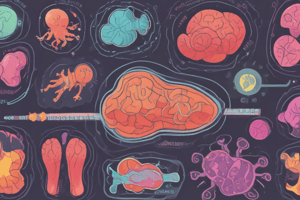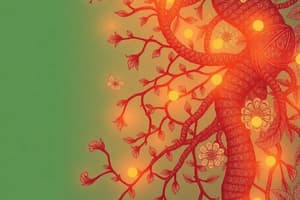Podcast
Questions and Answers
What indicates the presence of bilirubin in urine?
What indicates the presence of bilirubin in urine?
- Normal bilirubin levels
- Conjugated hyperbilirubinemia (correct)
- Unconjugated hyperbilirubinemia
- Hemolytic anemia
Which bilirubin detection test involves shaking urine to observe foam?
Which bilirubin detection test involves shaking urine to observe foam?
- Lugol iodine test
- Gmelin’s test
- Foam test (correct)
- Fouchet’s test
What is urobilinogen primarily produced from in the intestine?
What is urobilinogen primarily produced from in the intestine?
- Unconjugated bilirubin
- Bile acids
- Conjugated bilirubin (correct)
- Hemoglobin
What is observed in urine during acute viral hepatitis before jaundice becomes clinically apparent?
What is observed in urine during acute viral hepatitis before jaundice becomes clinically apparent?
Which test uses concentrated nitric acid to detect bilirubin?
Which test uses concentrated nitric acid to detect bilirubin?
What is the primary route of urobilinogen elimination from the body?
What is the primary route of urobilinogen elimination from the body?
Which condition is likely to cause increased urobilinogen in urine?
Which condition is likely to cause increased urobilinogen in urine?
What color indicates a positive Lugol iodine test for bilirubin?
What color indicates a positive Lugol iodine test for bilirubin?
What color indicates an increased amount of urobilinogen when using Ehrlich’s aldehyde test?
What color indicates an increased amount of urobilinogen when using Ehrlich’s aldehyde test?
In the Fouchet’s test, what indicates the presence of bilirubin?
In the Fouchet’s test, what indicates the presence of bilirubin?
Why might a post-meal urine sample be preferred for measuring urobilinogen levels?
Why might a post-meal urine sample be preferred for measuring urobilinogen levels?
What does the reagent strip or tablet test specifically detect?
What does the reagent strip or tablet test specifically detect?
Which type of jaundice shows an absent bilirubin in urine?
Which type of jaundice shows an absent bilirubin in urine?
What is formed from urobilinogen upon oxidation?
What is formed from urobilinogen upon oxidation?
Which test is used to distinguish between urobilinogen and porphobilinogen?
Which test is used to distinguish between urobilinogen and porphobilinogen?
Which condition is likely to cause reduced urobilinogen levels in urine?
Which condition is likely to cause reduced urobilinogen levels in urine?
What indicates a positive result in the ammonium sulphate test for ketone bodies?
What indicates a positive result in the ammonium sulphate test for ketone bodies?
What is the minimum concentration of acetoacetate or acetone detectable using the Acetest tablet test?
What is the minimum concentration of acetoacetate or acetone detectable using the Acetest tablet test?
What is a characteristic outcome of the Ferric chloride test in the presence of acetoacetic acid?
What is a characteristic outcome of the Ferric chloride test in the presence of acetoacetic acid?
What can cause a false-negative result in reagent strip tests for ketone bodies?
What can cause a false-negative result in reagent strip tests for ketone bodies?
What form of bilirubin is typically undetectable in the urine of healthy individuals?
What form of bilirubin is typically undetectable in the urine of healthy individuals?
Which of the following statements about conjugated bilirubin is true?
Which of the following statements about conjugated bilirubin is true?
What is a limitation of the Ferric chloride test for detecting acetoacetic acid?
What is a limitation of the Ferric chloride test for detecting acetoacetic acid?
Which component is not part of the Acetest tablet?
Which component is not part of the Acetest tablet?
What is true about amorphous material?
What is true about amorphous material?
Which crystals are found in alkaline urine?
Which crystals are found in alkaline urine?
What are casts in urine primarily formed from?
What are casts in urine primarily formed from?
What type of cast is most commonly seen in healthy individuals?
What type of cast is most commonly seen in healthy individuals?
Granular casts are primarily a result of which process?
Granular casts are primarily a result of which process?
What condition are waxy casts often associated with?
What condition are waxy casts often associated with?
Fatty casts are formed from the breakdown of which type of cells?
Fatty casts are formed from the breakdown of which type of cells?
In which situation might hyaline casts increase in number?
In which situation might hyaline casts increase in number?
What do ingested nitrites get converted into before being excreted in the urine?
What do ingested nitrites get converted into before being excreted in the urine?
Which test detects the presence of the esterase enzyme released from leucocytes in urine?
Which test detects the presence of the esterase enzyme released from leucocytes in urine?
What type of cells are not detected by the leucocyte esterase test if they are present in numbers less than 5 per high power field (HPF)?
What type of cells are not detected by the leucocyte esterase test if they are present in numbers less than 5 per high power field (HPF)?
What are unorganized substances in urine primarily composed of?
What are unorganized substances in urine primarily composed of?
What is the initial step in microscopic urinalysis?
What is the initial step in microscopic urinalysis?
What is one characteristic of normal urine microscopy?
What is one characteristic of normal urine microscopy?
Which urine pH condition best preserves cellular elements?
Which urine pH condition best preserves cellular elements?
What are crystals in urine primarily characterized by?
What are crystals in urine primarily characterized by?
Flashcards are hidden until you start studying
Study Notes
Urine Tests for Ketone Bodies
- Rothera’s test is a chemical test for ketones using sodium nitroprusside, glycine, and an alkaline buffer.
- Acetest tablet test is a variant of Rothera’s test which is more sensitive than reagent strip tests for ketones, detecting levels as low as 5mg/dl.
- Ferric chloride test uses a 10% ferric chloride solution to detect acetoacetic acid, producing a reddish or purplish color in the presence of the acid.
- Reagent strip tests modify the nitroprusside test and have a sensitivity of 5-10mg/dl for acetoacetate.
Urine Tests for Bilirubin
- Bilirubin, a product of hemoglobin breakdown, is not normally present in the urine of healthy individuals.
- Bilirubinuria indicates the presence of bilirubin in the urine, and can suggest a variety of conditions.
- Unconjugated bilirubin is not water-soluble and bound to albumin, making it unable to pass through the glomeruli.
- Conjugated bilirubin is water-soluble and easily filtered by the glomeruli, leading to its appearance in the urine.
- Foam test involves shaking urine and observing the foam for yellow color, indicating the presence of bilirubin.
- Gmelin’s test adds concentrated nitric acid to urine, causing a play of colors to appear if bilirubin is present.
- Lugol iodine test uses Lugol iodine and urine to detect bilirubin with the formation of green color.
- Fouchet’s test uses a reagent containing trichloroacetic acid and ferric chloride to react with bilirubin in a precipitate, leading to a blue-green color.
- Reagent strips or tablets impregnated with diazo reagent react with bilirubin and indicate the presence of bilirubin through a colour change.
Urine Tests for Urobilinogen
- Urobilinogen is a colorless product of conjugated bilirubin converted by bacteria in the intestines.
- Urobilin is the orange-yellow byproduct of urobilinogen oxidation.
- Increased urobilinogen in urine suggests hemolysis, an increased breakdown of red blood cells, leading to increased bilirubin and urobilinogen production.
- Reduced urobilinogen in urine suggests obstructive jaundice, where the blockage of the biliary tract prevents bilirubin from reaching the intestines, reducing urobilinogen formation.
- Ehrlich’s aldehyde test uses Ehrlich's reagent to react with urobilinogen, producing a pink color whose intensity is proportional to the amount of urobilinogen present.
- Watson-Schwartz Test differentiates between urobilinogen and porphobilinogen.
Urine Microscopy
- Normal urine is typically devoid of cells, crystals, casts, and other microscopic substances.
- Urine sediment contains microscopic substances that are organized or unorganized.
- Organized substances: red blood cells, white blood cells, epithelial cells, casts, bacteria, and parasites
- Unorganized substances: crystalline and amorphous material
Urine Microscopic Cells
- Epithelial cells are lining cells found in urine, and can indicate inflammation or injury.
- Red blood cells can indicate bleeding in the urinary tract, kidneys or other organs.
- White blood cells indicate infection or inflammation in the urinary tract.
Urine Crystals
- Crystals are refractile structures with a definite geometric shape formed due to the arrangement of atoms and molecules.
- Amorphous material has no definite shape and appears as granular aggregates.
- Acidic urine crystals: uric acid, calcium oxalate, cystine, leucine
- Alkaline urine crystals: ammonium magnesium phosphates, calcium carbonate, amorphous phosphates, ammonium urate crystals.
Urine Casts
- Urinary casts are cylindrical aggregations of particles formed in the distal nephron and dislodged into the urine.
- Cellular casts: red blood cell casts, white blood cell casts, renal tubular epithelial cell casts.
- Non-cellular casts: hyaline casts, granular casts, waxy casts, fatty casts.
- Hyaline casts are composed of solidified Tamm-Horsfall mucoprotein.
- Granular casts are formed by the degeneration of cellular casts or direct aggregation of plasma proteins or immunoglobulins.
- Waxy casts represent the final stage of cellular cast degeneration, associated with chronic renal diseases.
- Fatty casts are formed by the breakdown of lipid-rich epithelial cells.
Studying That Suits You
Use AI to generate personalized quizzes and flashcards to suit your learning preferences.




